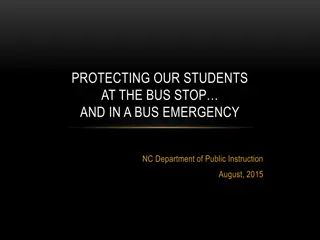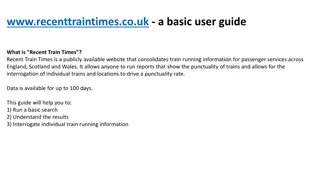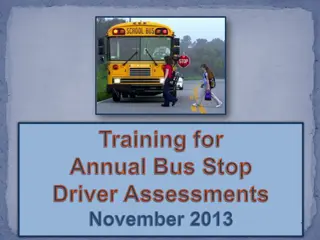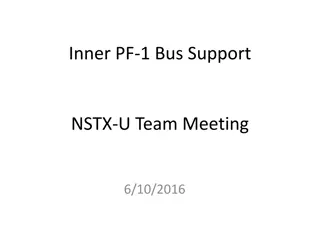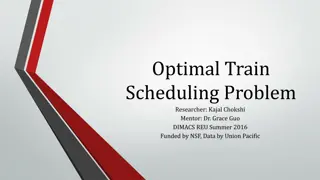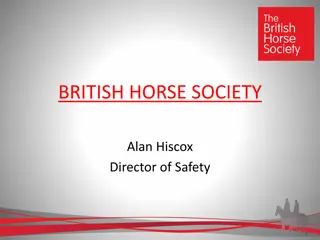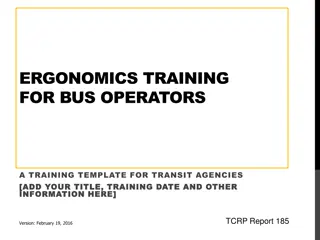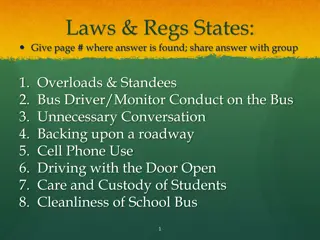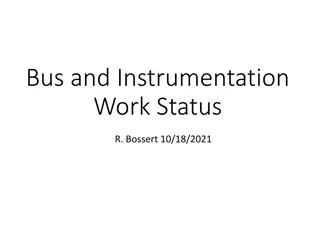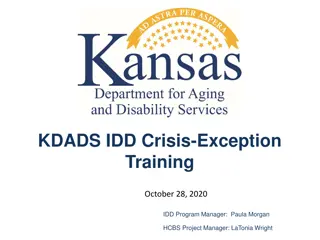Honoring Crisis Heroes: The Role of Bus and Train Drivers
Focusing on the unsung heroes of the COVID-19 crisis, this article sheds light on the crucial role bus and train drivers play in maintaining essential transportation services. Despite facing challenges such as reduced schedules and safety concerns, these workers demonstrate resilience and dedication. Discover the impact of the pandemic on their jobs, qualifications needed, job statistics, and more.
Download Presentation

Please find below an Image/Link to download the presentation.
The content on the website is provided AS IS for your information and personal use only. It may not be sold, licensed, or shared on other websites without obtaining consent from the author. Download presentation by click this link. If you encounter any issues during the download, it is possible that the publisher has removed the file from their server.
E N D
Presentation Transcript
Abbots Lea School CAREERS OF OUR CRISIS HEROES
This week we are focusing on some the workers who are getting people and things around.
Crisis Heroes We are celebrating the amazing #CrisisCareersHeroes who are helping us all get through the coronavirus outbreak. we want to thank all of these amazing people from the bottom of our hearts and help you learn more about the things they do in their jobs. Many of these workers don t get the praise or attention they deserve during normal times. But it is people like cleaners, delivery drivers, supermarket staff, nurses and school staff who are keeping us safe, healthy and happy at this time, while also enabling society to function. Today we re focusing on the workers who are getting people and things around. We're shining a spotlight on the work of bus and train drivers, delivery drivers, postal workers and warehouse staff.
What do they do? Bus and train drivers keep our public transport going so key workers can travel to work and so we can all access medical services and get to the shops. How has their job been affected by coronavirus? Many bus and train companies have reduced their services because of falling demand which means drivers work schedules have changed. Buses and trains are being deep cleaned frequently to kill the virus. On buses, some companies are attaching plastic screens to the cab to protect drivers from infection and providing gloves, masks and hand sanitizer for drivers. Customers are being encouraged to pay by card to avoid drivers having to handle cash. Where possible, train drivers are alone in the engine cab to reduce risk of infection. There are concerns that in some cases these protective measures are not being taken quickly enough and that this is putting workers at risk.
Job stats Pay: Bus driver 24,000 / Train driver 55,000. Average working week: Bus driver 45 hours per week / Train driver 35 hours per week. Types of shift: Bus drivers work mixed shifts of early mornings and mid shifts / Train drivers typically alternate between early, middle and late shifts. Demand: The overall number of bus and train driver jobs is expected to fall in future but retirement will create tens of thousands of vacancies How do you qualify for this job? Bus driver You ll need to hold a full EU driving licence to apply to become a bus driver. If you apply successfully, you will train for a Passenger Carrying Vehicle (PCV) licence and Driver Certificate of Professional Competence (CPC Driver) with the operating company. You will need to pass 4 tests to get your CPC Driver certificate. Train driver You can apply directly to a train operating company to become an engine driver and normally need good GCSEs in English and maths to qualify. Apprenticeships are available. You will need to have excellent eyesight and hearing and some companies require you to be 21 or over. You will complete hundreds of hours of training in all conditions.
What do they do? Delivery drivers make sure stock gets from the warehouse to the shops and that online orders get from the distribution centre or supermarket to your home. Without them, shop shelves would remain empty and you wouldn t get your food order or Amazon parcel. How has their job been affected by coronavirus? Many delivery drivers are working extra hours because of staff shortages and the need to distribute equipment across the country. As you ve probably noticed, orders to home addresses are now being left outside the property and signatures are no longer required when orders are received. This means delivery drivers don t have to have unnecessary contact with customers. Some workers in these fields are on tenuous contracts and fear losing their jobs if they take time off because they are unwell. This means some workers are going into work even if they are ill.
Job stats Pay: 20,000 (depending on type of work e.g. HGV drivers earn an average of 27,000). Average working week: 44-46 hours. Types of shift: Shifts can be quite unpredictable and vary at short notice. You could have to work overnight. Demand: A small reduction in jobs is expected but retirements will create tens of thousands of new jobs. How do you qualify for this job? You will need good GCSE grades and a full UK driving licence, often for a minimum period. You can start this job by applying directly to the employer or through an intermediate apprenticeship. To become a truck driver, you will need to train and take an additional test to gain a special HGV licence.
What do they do? Mail sorters work in sorting officers in sorting and administrative roles, organising post and coordinating deliveries. Postal workers deliver mail to home and business addresses. How has their job been affected by coronavirus? Postal workers are now leaving packages outside customers doors instead of handing them over directly and customers no longer have to sign for deliveries. There have been worries that workers at sorting offices are not getting enough protective equipment such as gloves and masks, despite having to work in close proximity to each other and handle thousands of people s mail.
Job stats Pay: 20,000. Average working week: 41-43 hours. Types of shift: Postal workers often work early shifts, delivering post early in the day and finishing early-mid afternoon. Demand: Mail sorters and postal worker jobs are expected to increase over the coming years. How do you qualify for this job? If you have good GCSE grades, you can apply for jobs with Royal Mail or the Post Office directly. You may be able to apply through an apprenticeship. A driving licence will help you gain work as a postal worker.
What do they do? Warehouse workers load and unload delivery lorries and sort, store and fetch stock. They also carry out administrative tasks to ensure deliveries and dispatches are logged. It is a physical job which requires a great deal of endurance and stamina. How has their job been affected by coronavirus? Warehouse workers handle a lot of stock and work in close proximity to other workers. Therefore they are at particular risk during this outbreak, and are reliant on employers providing personal protective equipment such as gloves and facemasks as well as hand sanitizer. Some workers say that they are concerned for their safety as they have to work closely with other staff in confined spaces. This makes it difficult to maintain the 2-metre distancing rule within warehouses and distribution centres.
Job stats Pay: 18,000. Average working week: 35-40 hours. Types of shift: Fixed shifts which could include daytime, evenings, nights or early mornings. Demand: Jobs are expected to decline in this field of work although retirements will create some new ones. How do you qualify for this job? Anyone with good GCSEs can apply for a warehouse job but employers look for those with good physical fitness and the ability to withstand long hours on their feet.
Sarah is a postal worker delivering mail to addresses on her route. As part of this week's #CrisisCareersHeroes campaign, she talks about how the coronavirus crisis has affected her day-to-day work. Find out about her job on the next page
Name: Sarah Harnett Role: Postal worker #CrisisCareersHeroes field of work: Getting people and things around Industry: Transport & Logistics What does your job involve? My name is Sarah. I am a post woman and I work for Royal Mail. I collect letters and parcels from the sorting office and deliver them to people s houses. How has coronavirus affected your job? My job is a bit harder now as the parcel demands have gone through the roof, so I m very busy with parcels every day. Now what we have to do is put the parcel on the doorstep, knock on the door, stand at a safe distance and wait for the customer to come to the door. I am lucky as my office is providing gloves and hand sanitizer, and we are all using the 2-metre rule to stay away from each other. Also, instead of van sharing we are going out in separate vehicles. We are also cleaning down inside the vehicle at the end of every shift. It's just a bit more tiring as there are a lot more packets to deliver and we are still delivering all normal mail and door-to-doors leaflets as well. But we are only posting leaflets where we are delivering mail. We explain to the customer if a parcel needs signing for, we sign on their behalf so there is no cross-contamination. We just have to be extra careful these days.
Rachel is a heavy goods vehicle driver transporting food and animal feed up and down the country. As part of this week's #CrisisCareersHeroes campaign, she talks about how the coronavirus crisis has affected her day-to-day work. Find out about Rachel s job on the next page
Name: Rachel Johnson Role: HGV driver #CrisisCareersHeroes field of work: Getting people and things around Industry: Transport & Logistics What does your job involve? I am from a farming background, but my job is HGV driver. I currently drive a 44-tonne articulated tipper lorry. Our average day consists of hauling feed and food products e.g. wheat, barley, rapeseed. These products either go into the human food chain or into animal feed mills to be produced into feed blends. How has coronavirus affected your job? Currently with the coronavirus outbreak the working environment is becoming harder as time goes on. The problems I am seeing as a lorry driver are things such as the following: Paperwork: We have to take paperwork for the product producer (farmer or from mill to mill) meaning we have to handle the paperwork to transport to the delivery point. This means we could be transferring onwards any risk of contamination. Workload: During the first couple of weeks when the outbreak hit the UK, everyone was bulk buying. The mills couldn t produce quickly enough and we couldn t get them the product quickly enough not enough hours in the day! Another issue we are seeing now the quarries are closing is there s a lot of other companies undercutting us to get the work. On the road: The roads may be quieter but a lot of places are closed or closing. This includes service stations who in some cases are denying access to use the facilities even toilets! We are finding this with a lot of delivery locations too.


